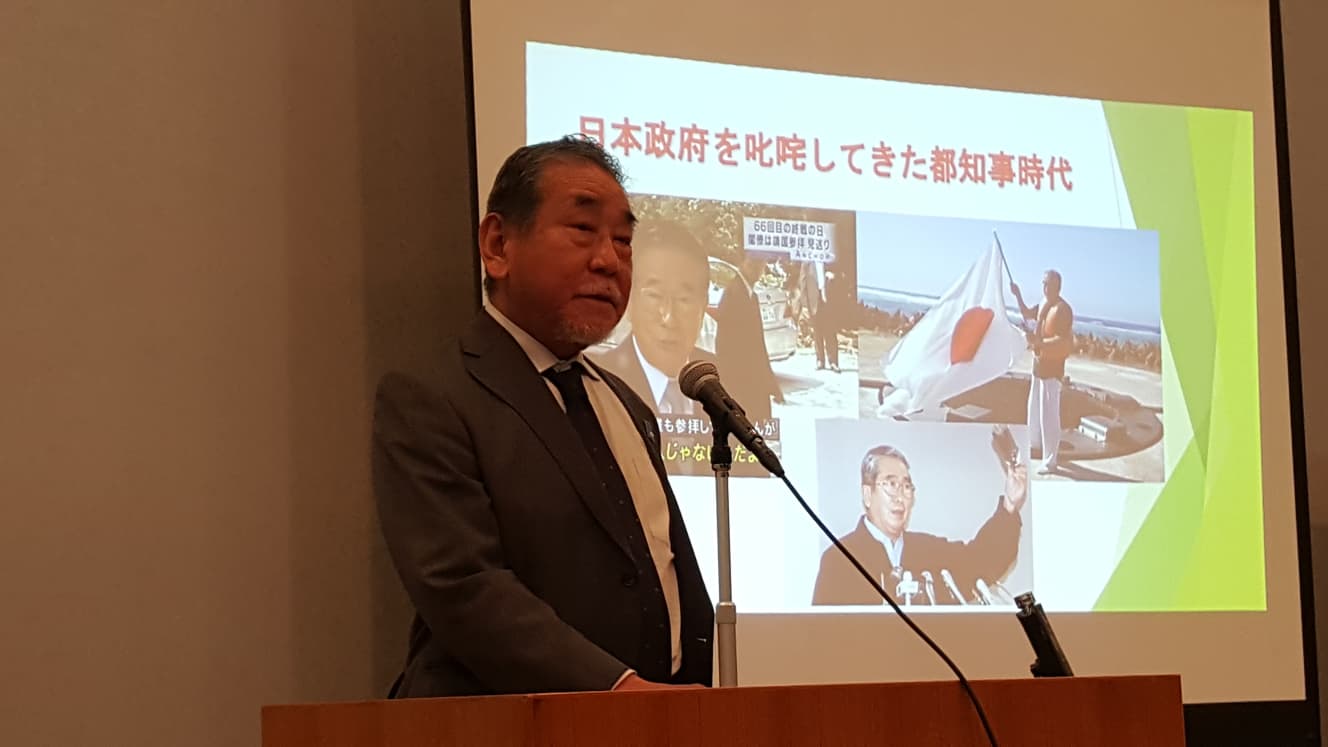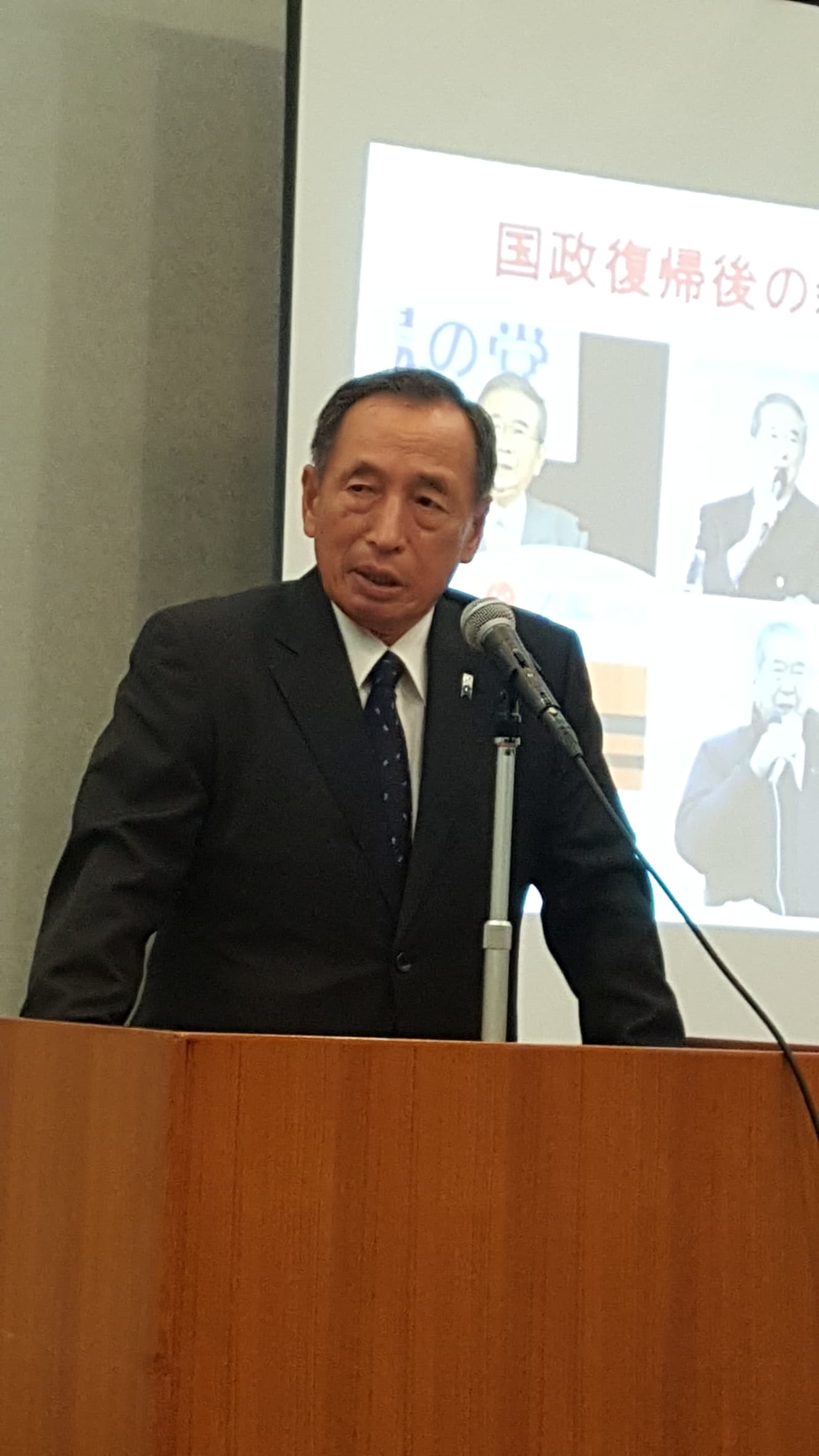Friends Gather to Mourn for the Late Shintaro Ishihara
It was a “memorial service” with a very unique atmosphere.
On February 12, a memorial service for Shintaro Ishihara was held at a public facility in Bunkyo, Tokyo. Twelve celebrities gathered at the event, including Shingo Nishimura, former member of the House of Representatives, Toshio Tamogami, former Chief of the Air Staff, and Hiroshi Totsuka, headmaster of Totsuka Yacht School.
The 12 members included Shingo Nishimura, a former member of the House of Representatives; Toshio Tamogami, former chief of the Air Staff; and Hiroshi Totsuka, headmaster of Totsuka Yacht School. With members of the press and the general public present, each of them used their own unique phrases and words to remember Shintaro, who passed away at the age of 89.
We can’t use the name ‘Rise Up, Japan. When I asked him if we could change the name to ‘Erect Japan,’ Mr. Ishihara naturally accepted it.
Mr. Nishimura shared a surprising “story behind the scenes” about the name of the new party established by Mr. Ishihara and others in 2010.
Mr. Nishimura is famous for his many “outbursts” that have become a problem. In an interview with a magazine, he said to a female Diet member who opposed the right of collective self-defense, “If you are raped, I will never help you.

Mr. Nishimura revealed the “secret story” of his relationship with Mr. Shintaro. Erect Japan” is a very strange name for a party, but Mr. Nishimura seemed to be serious about it. At the ceremony, he continued.
At the ceremony, he continued, “When other members of the Diet were signing a petition to expel Shingo Nishimura, Dr. Ishihara told us not to do that. I think he understood my feelings rather than rejecting my words.
(There may be some people who would sit back if they heard the words “Erection, Japan,” but Mr. Ishihara naturally accepted this kind of question and answer.
Perhaps Mr. Shintaro was the only one who would listen to such a proposal. Mr. Nishimura’s face showed his disappointment at having lost someone who understood him so well.
Next, Mr. Tamogami, known as “His Excellency,” took the stage. Tamogami was ousted in 2008 when he was the top Air Self-Defense Force official and chief of the Air Staff, after he argued in a civilian essay that Japan had been an aggressor nation.
Later, he ran for the Tokyo gubernatorial election in 2002 and garnered 610,000 votes, but was arrested for violating the Public Election Law (bribing campaign workers). Although he has had a tumultuous life, it seems that Shintaro has been a great help to him.
After I was fired from the Self-Defense Forces, I became close friends with Mr. Ishihara. I gave a speech at his breakfast meeting and had a conversation with him in a magazine. On a TV program, Mr. Ishihara asked me, “What do you think about nuclear armament to make Japan independent? I replied, ‘We should have nuclear weapons. It’s not right that the airspace over the capital is controlled by the Yokota Air Base.’ I was impressed by the way he said that.

Mr. Tamogami praised Mr. Shintaro as a “fighting leader” and stated his own theory.
Tamogami praised Shintaro as a “fighting leader” and said, “Right now, the prime minister and others are suffering from a disease that says it’s okay if they don’t cause problems. If the leader can’t fight, the people behind him can’t fight either. I think the symbol of the battle is the visit to Yasukuni Shrine. If the prime minister does not visit the Yasukuni Shrine, he is raising the white flag from the beginning, saying that he cannot fight. With such a prime minister, we will not be able to regain a strong Japan.
Don’t cause problems. The problem with Japan’s politics is that the leader says, “Don’t cause problems, don’t do your job. I have no expectations for the current prime minister, but I wanted Mr. Ishihara to be the prime minister.
I guess this is Tamogami’s way of mourning.
“Two hours of dialogue.
Shintaro told me that his unfinished business was education. I was waiting for him to call me, but he never did. When I called him, he said he was busy writing a book. He was like that until the day he died.
The person who mourned Shintaro’s death was Mr. Totsuka, a fellow yachtsman and the headmaster of Totsuka Yacht School. In fact, Ishihara is also the chairman of the “Totsuka Yacht School Supporters Association,” and in 1969 he published “Spartan Education: A Book for Raising Strong Children” (Kobunsha), in which he stated, “Don’t be afraid to hit your children” and “Raise them to be bullies. Mr. Totsuka had the same view of education as Mr. Shintaro.
Mr. Totsuka recalled his memories of Mr. Shintaro.
Mr. Totsuka recalled his memories of Mr. Shintaro: “After he was elected to the House of Councillors in 1968, I went to congratulate him with all my sailing friends. Until then, I used to call him Mr. Shintaro. When I called him “Sensei,” he said, “Don’t call me ‘Sensei’! You can call me the same as before.
During the 30-minute meeting, he talked about his yacht for two hours, and was eventually kept away from the secretary.
Nobukatsu Fujioka, vice president of the Association for the Creation of New Textbooks, and Eitaro Ogawa, a literary critic, also participated in the memorial service. I wonder how Shintaro received their voices.
Interview and text by: Daisuke Iwasaki
